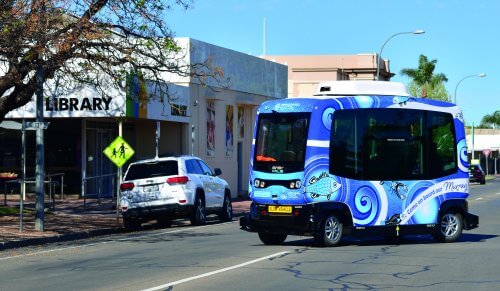
Since 9 February, Keolis has been testing a new autonomous electric shuttle in Renmark, a city of 10,000 residents 200km from Adelaide in South Australia. Visitors and residents are invited to use the service, which it says is particularly adapted to people with reduced mobility. Running on open roads, the EasyMile EZ10 autonomous shuttle serves the Renmark riverfront and a number of other key locations, including the municipal swimming pool, supermarket and food outlets. The autonomous shuttle is providing a free hop-on hop-off service every 30 minutes on Tuesdays, Wednesday and Saturdays on a six-stop, 2.4 km loop through the city centre.
During the trial phase, an on-board security operator is present at all times in the event of an emergency (such as the need for emergency braking), as well as to assist passengers during their journey and raise awareness of the project. Five Keolis Downer staff have been assigned to the project for the four months of the trial.
Integrating GPS, a range of cameras and sensors for odometry and extensive safety features, information is constantly shared between the EZ10 autonomous electric shuttle and its environment and urban infrastructure (such as traffic lights) to enable the shuttle is able to analyse and adapt its speed accordingly.
Keolis said that the purpose of the trial is to demonstrate the ability of autonomous vehicles to integrate and adapt to an urban area, and to contribute to the development of smart city solutions.
Since 2016 when Keolis trialled the first autonomous electric shuttle in Lyon, France, it has conducted over 30 autonomous electric vehicle trials throughout the world in major cities such as Paris, London, Montréal and Las Vegas, carrying more than 140,000 passengers on driverless vehicles every year. The operator said that such trials are key to facilitating the safe introduction of autonomous electric vehicles to urban areas.

